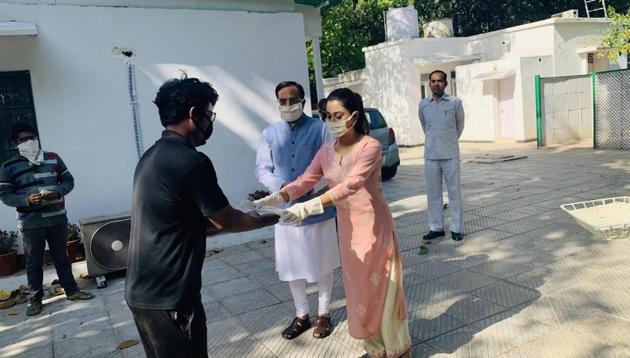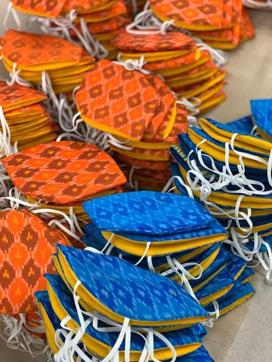The power of khadi: Hand-woven masks help protect against Covid-19, boost courage to fight
Khadi, the natural fiber cloth synonymous with the Swadeshi movement has emerged as a saviour during the pandemic
Face masks have become ubiquitous following the outbreak of Covid-19 pandemic. Touted as the first measure to protect against the virus, masks have become a common feature for all leaving their homes. As a result, there is a shortage and unavailability of masks.

Arushi Nishank, an environmentalist and Indian classical dancer, is on a quest to disseminate Mahatma Gandhi’s ideology of khadi through her reusable khadi masks and delivering them to our Army personnel.
She says, “We all are living in our homes and are fighting this global epidemic. While we are following the lock down, our brave soldiers on the border on one hand are fighting enemies and on the other they are tackling with this deadly virus. Through Sparsh Ganga foundation, we decided to send khadi masks to our brothers on borders.”

Khadi fabric, also known as khaddar, is a hand woven natural fibre made with cotton. Synonymous with Mahatma Gandhi and the Swadeshi movement, this fabric has a rugged texture and feels comfortable when worn during summers. For Arushi, more than a cloth, Khadi is an ideology and forms the identity of India as a nation. She says, “We chose Khadi for our masks because it is more sustainable, as a cotton mask requires 55 litres of water and a khaki mask just soaks up 3 litres of water.”
The foundation is also generating employment opportunities and is tying up with small and medium scale industries for large production of masks. She adds, “We have handed over around ten thousand masks to the authorities at Delhi, Uttarakhand and Maharashtra, which will be given to the doctors and soldiers who are constantly protecting us.”
In another bid for khadi, UP government has ordered 55 crore khadi face masks for the state’s rural population. The UP government’s initiative does not have a profit component and hence the khadi masks would be available at a cheaper rate in comparison to market price. 7 lakh- meter khadi has been provided to the rural development department. The face masks will be prepared through small self help groups (SHGs) in rural areas, thus generating employment.
Khadi, a hand-spun hand-woven fabric made of natural fibres has always stood the test of time. Pandemics, economic upheavals, historical events and climate change have destroyed many industries. But khadi has never altered its course of life in terms of sustainability and in terms of resilience to pandemics and health and hygiene.
Designer Manish Tripathi has also been distributing khadi face masks to people in Delhi. He says, “I chose khadi for face masks as it is an ethical fabric- requires less water, is hand woven and hand spun.”
He further adds, “With the government’s mandate to wear masks, it gave me an impetus to make these masks and distribute among people. I felt a person who cannot afford a square meal a day, how will he acquire a mask.”
Manish also feels that surgical and N95 masks create unnecessary fear and anxiety for onlookers. He says, “Though it is a mandate but surgical masks create a sense of foreboding and gloom. The khadi masks are colourful and compliment the person, thus reducing the levels of anxiety.” Tripathi is distributing around 150 masks daily to poor people as well as Covid-19 volunteers.






